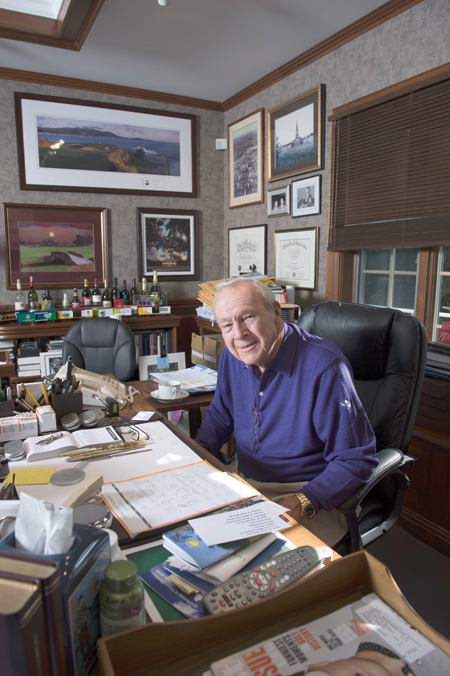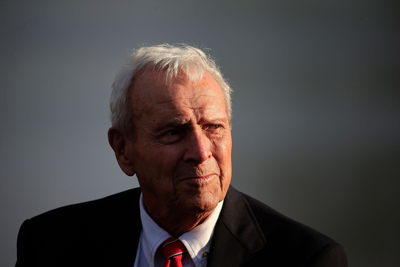Arnold Palmer won 62 PGA Tour events and seven majors, but winning wasn’t at the heart of his legendary marketing legacy.
“The important thing was never to market him as a winner,” said Alastair Johnston, Palmer’s longtime agent at IMG and chairman of Arnold Palmer Enterprises. “What we tried to do was to promote Arnold as a success. Everyone can relate to success more than winners. That was the fundamental image of Arnold.”
Palmer, who died Sept. 25 at age 87, turned pro in the mid-1950s. He proceeded to take what was then a country club niche sport and, with his signature swashbuckling style, push the game into the mainstream while building a global licensing and business empire based on authenticity.
It was the mix of authenticity combined with a remarkable ability to connect with people that led him to have an indelible impact on sports executives and the business for more than 50 years.
“Arnold was able to embrace the world rather than keep it away,” said Andy Pierce, president and CEO of Lagardère Sports Americas, who dealt with Palmer for two decades as a former IMG executive. “He set the standard.”
Pierce witnessed Palmer’s natural style in 1980 when, as a newly hired 27-year-old IMG executive, he introduced the superstar golfer using a bullhorn at an exhibition event in Ft. Pierce, Fla.
“I was nervous because Arnold was in the first pairing and I had the script all written out,” Pierce said. “There weren’t hand-held mikes in those days, there were bullhorns. I grabbed the bullhorn and halfway through, Arnold put his hands up and walked briskly toward me. He said, ‘I understand you are new. Here is my advice. I’m thinking that when there are less than 10 spectators, we should can the bullhorn.’ Then he said to the crowd: ‘I am Arnold Palmer and I want to introduce my friend Andy Pierce.’ It speaks to the respect he had for this young executive.”
Few, Johnston said, had a sense of the moment like Palmer, which only helped burnish his image.
“He knew when to walk into a room when it was the right atmosphere,” Johnston said. “He knew the time to stop and talk and the time to wink and nod and move on. He was very perceptive of what people thought of him.”
It was that intuition that served Palmer so well throughout his career, which resulted in his relationship with IMG that began with that famous handshake agreement with founder Mark McCormack in 1960 and led to long-term relationships with brands that laid the foundation for an athlete’s corporate relationship and public perception.
It was also at the heart of how Palmer maintained his relationships, which lasted for decades.
“Mark was smart and a great businessman, but what a way to begin a sports company,” said former IMG President Bob Kain, who worked with Palmer during his 30-year tenure at IMG. “Our first client was one of the greatest superstars in sports history. He probably had a longer career than any other superstar and he was intensely loyal. Along the way he taught us about relationships and how to treat others.”
Once Palmer signed a sponsorship deal, Johnston said, the contract went into a file drawer. From then on, the relationship — not the terms — most often dictated the agreement.
“This year will be 50 years since we signed our first year with Rolex,” Johnston said. “Is there any relationship in sports marketing that has lasted 50 years?”
Johnston recalls meeting Palmer in the mid-1970s and then spending a few years building the relationship that was cemented when Johnston cut Palmer’s deal with Pennzoil a few years later. From there, Johnston would go on to help direct the day-to-day business of Arnold Palmer.
“It took two to three years spending time with him and getting to know him,” Johnston said. “The transforming point was that he always wanted to do a deal with Pennzoil. He had a friend there and he said he wanted me to do it. It worked and I had earned my spurs.”
Considering that IMG was built on Palmer’s success and renown, it is no stretch to credit him with helping to build the sports agency business. All who talked last week about Palmer acknowledged his influence in establishing an industry where many now trade.
“You’re hearing a lot about his impact on golf, which was enormous and unparalleled, but he was also the centerpiece which ushered in and helped create the whole sports marketing industry as we know it, beginning in the 1960s with IMG,” said Gary Stevenson, former PGA Tour executive vice president of business ventures, who is now president of MLS Business Ventures and knew Palmer from his days at the tour.
While Palmer helped define the sports agency business, he also helped create another prominent sports property: Golf Channel, the Orlando-based network he co-founded in 1995 with cable entrepreneur Joe Gibbs (see related story).
 |
Palmer, in his office in 2015 and more recently this year (below), had an indelible impact on the sports business for more than 50 years.
Photo by: BARRY REEGER
|
When Mike McCarley was named Golf Channel president in 2011, the 36-year-old executive who had moved from New York to Florida to take the job, called to meet the then 82-year-old Palmer. The meeting led to a friendship marked by regular lunches, drinks and dinners as McCarley soaked up Palmer’s vast experience. When Palmer invited McCarley to go on a golfing trip during one Super Bowl weekend, McCarley figured he would fly down with Palmer’s other guests.
“He pulls up in the car and is driving to the airport,” McCarley said. “He was 82 and he’s driving me. We pull into the hangar and I keep thinking there will be other people, but it was just he and I and we end up staying in a cabin together. When my wife moved here she said my only friend in Florida was an 80-year-old. I said, yes, but the friend is Arnold Palmer. He was great in giving advice when asked. But he would never give up the dark side of why some deal blew up. Instead, he’d always ask me to go talk to someone else.”
To McCarley, the biggest lesson he learned while spending time with
 |
Photo by: GETTY IMAGES
|
Palmer was simple but timeless: Treat people the way you’d like to be treated.
“Every meal, he would be interrupted by people dozens of times and he was always respectful — always,” McCarley said. “The most lip I ever saw him give someone was when a guy asked him to sign ‘a few’ pin flags for his friends, he agreed and then the guy dropped 10 pin flags on the table. He smiled, pulled out his sharpie and started signing. About halfway through he looked up at the guy and said, ‘You must have a lot of friends.’ That’s as sassy as he got, and the guy took it as a compliment.”
Former PGA Tour Commissioner Deane Beman, who ran the tour from 1974 to 1994, first saw Palmer play at Bethesda Country Club in the mid-1950s. Beman was stunned to see Palmer’s power on the course. Decades later, as commissioner, Beman appreciated Palmer’s force and influence even as the two clashed over Beman’s strategy in growing the tour’s sponsorship business. No other golfer had his own “Arnie’s Army” fan following while ushering in a new era as golf came of age on television.
“Golf was established as a minor sport, and it did have great champions in Bobby Jones, Byron Nelson and Sam Snead, but Arnold came along and elevated the game beyond those great players,” Beman said. “My first experience with Arnold was like everyone else’s; he never met a stranger. When you met him, he made you feel like he already knew you. He was the people’s guy. That began the process of moving golf out of a small niche.”
Ray Clark, founder and CEO of The Marketing Arm, points to Palmer’s common touch as critical to his brand legacy.
“Palmer just always seemed like one of the guys,” he said. “So, combine that with his performance on the course, and 50 or 60 years later, he’s still relevant, which is a one-in-a-million scenario.”
The influence of Palmer on today’s stewards of the golf industry is hardly lost.
A few years ago, PGA of America CEO Pete Bevacqua found himself alone with Palmer in the clubhouse at Marion Country Club in Ohio. He remembers the meeting not just as a living lesson in the history of the game, but of a reminder of the global influence Palmer carried.
“We had a member event at Marion and I had hurt my back, so I couldn’t play,” Bevacqua said. “I spent the next four hours talking with Arnold about his father and the way he was raised. It was just the two of us in the club and it was a magical moment for me.
“To me, one of the most powerful things he accomplished was he democratized the sport. Everything that has happened with the global game you can trace back to Palmer. He was the first person to prove how powerful golf is in terms of sports marketing and the impact it would have. He was the first athlete to branch out and to say that it is not about selling golf clubs but he can represent any brand because of the respect he had.”
Mike Davis, executive director and CEO of the USGA, first saw Palmer when he captained the 1975 Ryder Cup. Four decades later, Davis and the USGA are the beneficiaries of Palmer’s everyman image that drew legions of fans to the game.
Davis, who last visited with Palmer just a few weeks before his death, said, “I can’t think of anyone that has done more for the game of golf, and not just commercially. Just look at people who wanted to hang around him. It was presidents, leaders of countries and icons of business. Everyone wanted to be around him.”
Staff writer Terry Lefton contributed to this report.





